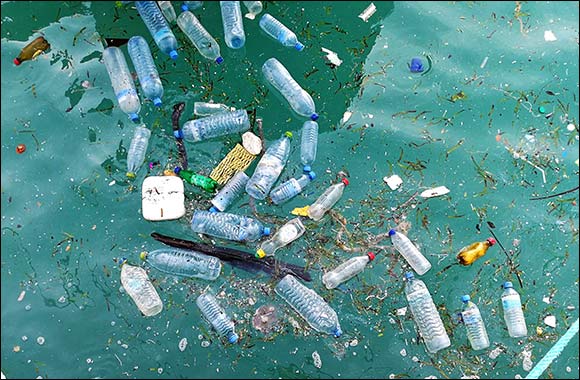
WCM-Q highlights alarming impact of plastic bottled water on human and planetary health
Doha – October 27, 2024: Researchers at the Institute for Population Health (IPH) of Weill Cornell Medicine-Qatar (WCM-Q) have published a commentary highlighting the massive global impact of bottled water on the health of people and the environment.
The commentary, published in BMJ Global Health, calls for an urgent rethink of international consumption habits, which see a staggering 1 million units of plastic bottled water sold every single minute worldwide.
The commentary challenges the widespread assumption that bottled water is safer and cleaner than tap water—in fact, in many countries, bottled water is subject to far looser quality standards than the rigorous standards that apply to tap water. Plastic bottled water has also been shown to carry the risk of harmful chemicals leaching from the plastic into the water itself, especially if the water has been stored for a long time or exposed to direct sunlight or high temperatures.
The researchers also point out that up to 80 percent of plastic bottled water samples have been found to contain harmful contaminants like microplastics, plus other harmful substances such as phthalates and bisphenol A (BPA), which are added to plastics to make them stronger and more flexible, but which are known to be endocrine (hormone) disruptors that are detrimental to human health.
Microplastic contamination has been shown to be associated with health issues such as immune system dysregulation and oxidative stress, while exposure to BPA is been linked to cardiovascular disease, diabetes, and obesity. The long-term effects of exposure to these chemicals remain unknown. Furthermore, plastic water bottles are the second most common ocean pollutant, accounting for 12 percent of all plastic waste, surpassed only by plastic bags.
The authors of the commentary from the IPH at WCM-Q are Dr. Ravinder Mamtani, professor and vice dean for population health and lifestyle medicine; Dr. Sohaila Cheema, associate professor of clinical population health sciences and assistant dean for the IPH; Dr. Amit Abraham, assistant director of the IPH; and Dr. Karima Chaabna, manager of population health, IPH. Dr. Albert Lowenfels of New York Medical College in Valhalla, New York, is also a listed author.
Dr. Mamtani said: 'The sheer magnitude of bottled water consumption, plus the evidence relating to contamination with harmful chemicals and microplastics, means that there is an urgent need for a serious conversation on the international stage about the impact of bottled water on the health of populations all over the world.'
The commentary, titled 'Rethinking bottled water in public health discourse,' makes a number of recommendations, calling for public health campaigns to address misunderstandings about the safety and cleanliness of tap water versus bottled water, increased investment in infrastructure in low- and middle-income countries to improve availability of clean tap water, and tougher regulations on bottled water to ensure safety and quality. The commentary notes the global nature of the issue, pointing out that Asia produces more than 80 percent of global plastic waste emitted into the oceans.
Dr. Cheema said: 'We believe that urgent action is needed to address this growing global issue. We can all benefit from reducing plastic waste, reducing environmental degradation, and greater protection from consumption of the harmful chemicals and microplastics that are often found in plastic bottled water.'
The commentary notes that bottled water is an important solution for meeting the needs of local populations in some low-income countries with poor water quality and underdeveloped infrastructure. However, the commentary also points out that in high-income countries, the preference for bottled water is often based on mistaken beliefs that bottled water is inherently cleaner and safer than tap water.
Dr. Abraham said: 'We can all make a positive difference. We recommend switching to tap water if you live in an area where the quality is good, switching to non-plastic reusable water bottles for yourself and your family, and always choosing glass bottled water or canned water if you are out and about.'
Home >> Healthcare and Fitness Section
200 Students Dive into Robotics Workshops in Qatar
Artemis Education Appoints World Champion Emma Igelström as Director of Aqu ...
Qatar Insurance Group Recognized at Google Cloud Summit Doha 2025 for Driving In ...
Education Above All Foundation and the American University of Beirut Celebrate t ...
Celebrate Eid with a Summer Glow: Catrice Launches Luxe Highlights for the Seaso ...
Doha Climate Talks Concludes with Enhanced Regional Climate Cooperation Commitme ...
Airline Profitability to Strengthen Slightly in 2025 Despite Headwinds
Luis Gallego Chairs IATA Board
Sony Middle East and Africa and Modern Home Introduce the Next Evolution of Nois ...
The Raptor Roar: A Legacy of High-Performance Off-Road Domination
Saleh Al Hamad Al Mana Co. Launches Special Offer on All-New Nissan Patrol 2025
Raffles doha appoints chef cristhian serraino as head chef of ALBA
essence Is Springing Into Season with the Glowiest Drop: Hydra Kiss LIP OIL
ESG, AI, and Architecture – Object 1's Future-Ready Vision
CASIO Unveils the G-SHOCK GA-2100BM: A Stylish and Durable Summer Essential
SAS Forecasting Hackathon Unveils Future Innovators at University of Doha for Sc ...
Air Cargo Demand up 5.8% in April
Google Cloud Summit Doha Celebrates Two-Year Anniversary of Local Region, Showca ...
Cartier Launches En Équilibre High Jewellery Collection In Stockholm


